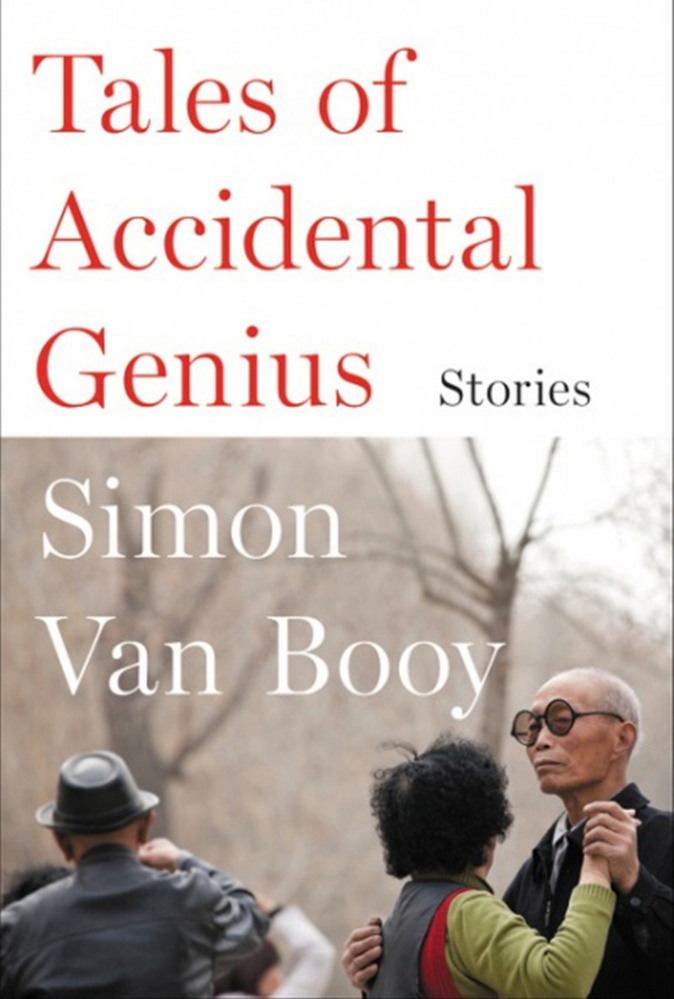The stories in Simon Van Booy’s new collection of short stories, “Tales of Accidental Genius,” are full of surprising intimacy and connection, often between strangers. In “The Muse,” a woman sews a button back on the coat of a stranger in a hotel lobby, and the two share defining moments of their lives. The story includes the stellar line, “The story of love is also the story of loneliness.”
This assessment could be the overall theme of the entire collection. Van Booy’s stories are always infused with life, most often with the pathos and challenge of characters living in a world that is seemingly indifferent to their existence. They are also infused with love.
The first story, “The Menace of Mile End,” is that of an older man who is disturbed almost nightly one winter by the plaintive cries of a homeless youth on the street beneath his window. He wishes the boy would go away, then worries about him out in the bitter cold when he does. When the boy returns, the old man looks out the window to see a group of men setting upon him with fists and feet. When he goes down to rescue the boy, the man discovers his own salvation.
Somewhat in contrast, “The Goldfish” is about a young man who is a clerk in a pet store who becomes moved to attend to a forlorn old man, keeping him from utter heartbreak by one of the most large-hearted – and “magical” – acts of compassion that I’ve ever read in fiction.
The last story in the collection, more truly a novella than a short story, is entitled “Golden Helper II: An Epic Fable of Wealth, Loneliness, and Cycling.” It is indeed a fable, one that could be considered a marvelous children’s story but that will resonate richly with adult readers. The story is presented as a “Working Script/Story Notes,” and is set up by the short story that precedes it, “Private Life of a Famous Chinese Film Director.”
It is the saga of a poor, blind Chinese man who dreams of being an engineer while he and his wife sell vegetables they take to market on the family bicycle. With the man’s death, his son takes over the business, continuing to transport vegetables using the near-perpetual motion motor that his father invented to power the bicycle. Love found, fate, love lost, accidents and ghosts are all stirred together in this amazingly inventive and moving story about the selfless goodness of people.
In addition to the story itself, one of the marvels of “Golden Helper II” is its formatting on the page. The lines are typically short, with wide variation in the number of lines per page. They visually present as a combination of poetic stanzas and a “translation” of something originally written in Chinese. It takes a bit getting used to, but the unique structure brings Van Booy’s writing – the actual crafting of sentences – more sharply into focus, highlighting the clean, lean elegance – and eloquence – of his work. It is as if he’s subtly teasing the reader to pay attention, to notice the landscape of the lines. Many of the lines are single, simple sentences, others broken to highlight singular phrases and clauses. The literary device illuminates how powerful clean prose can be.
Van Booy’s muse is uncommon in its penetrating wisdom. Part of this comes through a kind of non-presence that Van Booy has as a writer, letting the language and the story assert themselves. This is not to say that doing such is easy. He writes in a fascinating afterword, entitled “The Stories Behind the Stories,” that “The Chinese fable in this collection was by far the hardest piece of fiction I’ve ever written.”
Elsewhere in the afterword, he summarizes a mindset that guided him in shaping the characters in his stories by paraphrasing Immanuel Kant as to how one should live in the world. Van Booy writes: “In other words, learn to observe your daily behavior. Then ask yourself: if everyone behaved the way I am now under similar circumstances – would this be a world I want to live in?”
One of the beauties of all Van Booy’s stories, including in his two prior stories collections and in two novels, is that he tells his stories without affectation, but ever so effectively as a stylist and a devout humanist. One amplifies the other, making his stories literary treasures.
Frank O Smith is a Maine writer whose novel, “Dream Singer,” was named a Notable Book of the Year in Literary Fiction in 2014 by “Shelf Unbound” and a finalist for the Bellwether Prize, created by best-selling novelist Barbara Kingsolver “in support of a literature of social change.” Smith can be reached via his website: frankosmithstories.com
Send questions/comments to the editors.




Success. Please wait for the page to reload. If the page does not reload within 5 seconds, please refresh the page.
Enter your email and password to access comments.
Hi, to comment on stories you must . This profile is in addition to your subscription and website login.
Already have a commenting profile? .
Invalid username/password.
Please check your email to confirm and complete your registration.
Only subscribers are eligible to post comments. Please subscribe or login first for digital access. Here’s why.
Use the form below to reset your password. When you've submitted your account email, we will send an email with a reset code.